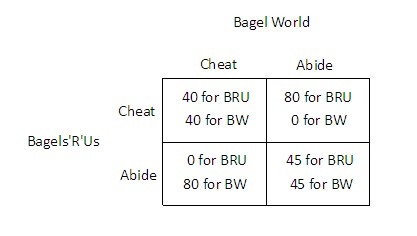The market for bagels contains two firms: BagelWorld (BW) and Bagels'R'Us (BRU). The owners of the two firms decide to fix the price of bagels. The table below shows how each firm's profit (in dollars) depends on whether they abide by the agreement or cheat on the agreement.  Suppose the game above is repeated every day, and both firms adopt the following strategy: cooperate on the first day, then if the other firm cheats, cheat the next day, and if the other firm abides, abide the next day. This type of strategy is likely to increase the probability that:
Suppose the game above is repeated every day, and both firms adopt the following strategy: cooperate on the first day, then if the other firm cheats, cheat the next day, and if the other firm abides, abide the next day. This type of strategy is likely to increase the probability that:
A. Bagel World cheats.
B. both firms abide.
C. Bagels 'R' Us cheats.
D. both firms cheat.
Answer: B
You might also like to view...
When government expenditures exceed revenues there is a government budget deficit.
a. true b. false
Emma uses a linear model to forecast quarterly same-store sales at the local Garden Center. The results of her multiple regression is: Sales = 2,800 + 200•T - 350•D where T goes from 1 to 16 for each quarter of the year from the first quarter of 2006 (‘06I) through the fourth quarter of 2009 (‘09 IV). D is a dummy variable which is 1 if sales are in the cold and dreary first quarter, and
zero otherwise, because the months of January, February, and March generate few sales at the Garden Center. Use this model to estimate sales in a store for the first quarter of 2010 in the 17th month; that is: {2010 I}. Emma's forecast should be: a. 5,950 b. 6,200 c. 6,350 d. 6,000 e. 5,850